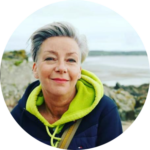ABOUT ME – AND THE EVENTS WHICH LED TO THIS RESEARCH

I am Kerry Cressey. I was born into a working-class family in Sheffield, Northern England, in 1971. My dad was an auto electrician by trade on the then publicly owned transport system. My mum worked in the canteen of Sheffield’s Children’s Hospital.
I wasn’t really aware of ‘class’ growing up, that came much later as I ventured into the heavily middle-class dominated field of ‘refugee work’. Here, for the first time in my life, I felt a sense of being different.
My journey into the sector began over 20 years ago when an African refugee family moved on to the estate where I was living.
They’d been moved from asylum housing and got a maisonette near us. I helped them with the simple things-appointments at the housing office, where the supermarkets were and the transport system. The things you need in order to settle in.
I found that time rewarding and wondered if I could do something like that for a job, but I didn’t have the qualifications or the formal experience and by this time in my life I was on the unrelenting treadmill of rent and bills to pay so couldn’t afford the further education that this would have required. But I did have one thing, a day off each week in which I could build up experience by volunteering.
In 2002 I found SAVTE (Sheffield Association for the Voluntary Teaching of English). It’s an organisation that recruits and trains volunteers to help people learn English. I applied to volunteer with them and during my time as a volunteer, helped five women from various backgrounds learn English.
I volunteered for five years until a job vacancy came up with them, I applied for it but didn’t get it initially. It came up again a second time and this time I was successful. I started work for SAVTE in May 2007.
I’d say this was where my journey into class awareness began. I started to notice the lack of working-class representation in the sector as a whole and the negative effects that has on refugee integration. The catalyst to this was the first ‘multi agency’ meeting I attended.
At this point in time, I was one year free from living on one of Sheffield’s most economically deprived council estates. We had lived there just over nine years; we had suffered such targeted anti-social behaviour from our neighbours that, for a time, the police had fitted CCTV to our house along with a panic alarm. I was terrified to come and go.
Finally, after much petitioning, the council agreed to let us apply to move; we were given ‘priority status’, which meant we were put on a list with hundreds (maybe thousands) of others with ‘priority’.
We bid on house after house, seventeen in all, until we finally secured the house we still live in today. The whole process took just over six months, and that’s a long time when you’ve been threatened to have your throat ripped out, you’re scared to come and go, when you can’t go out in your garden, you’re looking over your shoulder when you get off the bus or go shopping in the nearby shops.
And so I find myself in the above-mentioned meeting. It was where the different refugee agencies in Sheffield came together once a month to network, share updates, etc.
I spent the start of this meeting in silence. ‘impostor syndrome’ was in full swing during my early years in my new vocation. I worried that if I spoke, I would out myself as someone who shouldn’t really be there, so I used to keep quiet and observe, hoping no one would ask me a question.
However, one agenda item in particular had got my attention, and I listened intently as they began to discuss refugees’ place on the council housing waiting list. They thought it ‘awful’ that a typical refugee family would have to spend a few months in temporary housing whilst bidding for houses on the council’s waiting list. What could be done to ease this predicament?
“They should have a special place for refugees on the waiting list,” announced one woman, “a place which would grant refugees priority over everyone else waiting.”
I looked in horror as people began to nod at the idea which was widely gaining acceptance around the room.
I really couldn’t remain silent any longer.
“No!” I exclaimed, as I continued to process the awful events that would no doubt transpire should an idea like this ever materialise. “That would just fuel tensions – EVERYONE who applies for council housing has to go through this same process,” I continued.
Thankfully in the end the suggestion was dropped. However, later on in another one of these meetings, one asylum campaign group was running a campaign to get a woman and her child moved from her asylum housing on the basis that the stairs in the house were too steep.
It was a terraced house.
Stairs are steep in Northern terraced housing.
I know this because, like a large proportion of Sheffielders, I grew up in one. My dad used to call our staircase the ‘north face of the Eiger’. Can you imagine if they’d been successful and that story got out? The resentment that would ripple out through working class communities? I doubt the woman in question ever even complained or requested to move but was probably the victim of a well-meaning activist.
These exchanges were not only eye-opening but as I said a catalyst for me. Why on earth would these people think these solutions were a good idea?
Maybe because when you’re accustomed to and observe circumstances through the lens and back-drop of privilege, normality can seem like oppression.
I began to see the power dynamic, and who had the places around decision-making tables and how this reflected in the decisions made. Certainly no one from the council house waiting list was to be found here, those whose lives decisions like this would negatively affect.
This needs to drastically change. We have come on leaps and bounds as a society in the area of widening diversity and inclusion towards many groups – this needs to also include social class. Imagine if the majority of people in those meetings had had the same lived experience as myself or a refugee family navigating the social housing system? Imagine the change in discussion and the ideas and conclusions we would settle on.
Decisions which would benefit a community as a whole and not ones that bring division and pit neighbour against neighbour.
At the end of the day, my Polish, Libyan, Afro-Caribbean neighbours are not my competitors or enemies; we share life together and help each other out.
 As Hashi Mohammed says in his brilliant podcast “Getting On and Getting Along: Race and Class”, “Those at the bottom of society have much more in common with each other than they do with their fellow ethnic group further up the social ladder.”
As Hashi Mohammed says in his brilliant podcast “Getting On and Getting Along: Race and Class”, “Those at the bottom of society have much more in common with each other than they do with their fellow ethnic group further up the social ladder.”
![]()
The views and opinions expressed in this report and its content are those of the author and not of the Churchill Fellowship or its partners, which have no responsibility or liability for any part of the report. All images are the author’s own unless otherwise stated.

